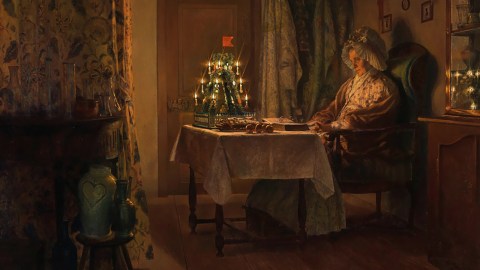No, Christmas is not a stolen pagan festival. There are 3 problems with that argument

- It’s often repeated that Christmas is a stolen festival — that Christians appropriated pagan ideas and celebrations as an act of suppression.
- This misunderstands the Christian mindset. Church Fathers were a lot less concerned about “rival” theologies than the likes of Dan Brown might have us believe.
- The fact that Christmas aligns with other festivals, or that certain traditions have pagan roots, does not make Christmas any less a Christian celebration.
This Christmas, I can rely on three things. First, the turkey will be overcooked and dry. Second, my brother will utterly ignore my Christmas list and buy me some ridiculous miscellany of weirdness. And, third, my dad will go on a rant about how Christmas is “stolen.” He’ll tell me, with the confidence of an old man who’s read Dan Brown, that it’s all just paganism repackaged. It’s Saturnalia, Sol Invictus, or the Feast of Mithras superimposed with a clunky image of Jesus. Christmas isn’t Christian; it’s the manipulation of a devious, Machiavellian Church who just stole everything good.
Every year, I roll my eyes and mumble something like, “I think it’s a bit more complicated, Dad,” in a placating olive branch of good spirit. This year, though, I’m going to try something different. I’m going to point him to this article. If you have anyone in your life who also, predictably and tediously, tells you, “Christmas is just a pagan festival,” feel free to do the same.
It’s a position that has three major problems.
Problem 1: It misunderstands the Church
For many philosophers (from Nietzsche onward), the Christian Church has been enemy #1. They’re the sinister puppet masters who manipulate world events, destroy all that’s good, and give the world nothing but misery. It’s a narrative that became so dominant in many circles that when The Da Vinci Code was released — with an evil Church twisting everything to their own venal ends — it fell on sympathetic ears, many of which believed the story to be true. The idea is that the Church was so threatened by “rival” religious festivals, like Mithras and Saturnalia, that it deliberately put their own festival right in the middle of them, to take away all the attention.
The problem, though, is that this misunderstands how Christian theologians saw (and still see) the world. For Christians, the entire universe — all of “creation” — has Christ at its center. Scholars like Bede in England even started dating the years after Anno Domini (the year of the Lord). All of history was either before Jesus or after him. The fact that pagan festivals had their own mid-winter celebrations did not challenge Christianity but confirmed it. It showed that Jesus was at the core of all things, even before his Incarnation. When the Romans celebrated Saturnalia, the Greeks celebrated Mithras, or the Egyptians celebrated Isis around the same time, this only showed that they were stumbling closer to the truth — the truth of Christ.
The Church did not need to compete with pagan worship; it saw paganism as “before” Jesus but also containing heraldic hints of his arrival. There was no cynical, deliberate “theft” or “appropriation” but simply a gradual assimilation.
Problem 2: Independent dating systems
In a recent interview for Big Think, Sasha Sagan makes the fascinating point, “So many of our celebrations around the world are tied to four points in the year.” Wherever you go in the world, whenever you look in history, people tend to celebrate festivals and have their sacred rituals at similar times of the year. They mark the changing seasons. The fact that Christmas falls around the same time as many, many other religious festivals is not suspicious — it’s unavoidable. (Besides, for Christians, Easter is the more important event.)
The fact is that Christians arrived at December 25th not because that’s what everyone else was doing but because of some pretty basic theological dating. In both Judaism and early Christianity, there was great belief in symmetry — a divine neatness to the order of things. So, early Church Fathers came to believe that Jesus must have died on the anniversary of his Incarnation (which means the conception in Mary’s womb). It was thought that Jesus died on March 25th. If he was also conceived on March 25th, then he must have been born on December 25th.
It’s important to emphasize that this is what they believed – this was not intended to historically date Jesus’ birth based on civil records and scholarly corroboration. It was an act of religious faith – rabbis and Church Fathers believed in symmetry of this kind. You might find that ridiculous, but that’s a problem with (early) Christianity as a faith, not their dating logic per se.
Problem 3: The pagan “originals” are not that similar
When someone says that Mithras was also born on December 25th, ask them which scholar they are referring to when they say that. Which historian or theologian can validate that fact? As the historian Tom Holland points out:
“There is no evidence — absolutely none — that the birth of Mithras was celebrated on 25 December. The confusion seems to have arisen because Mithras had Sol Invictus, ‘Unconquered Sun,’ as one of his titles, and — according to an ambiguous entry in a mid-4th century almanac — the birthday of a quite different god called Sol Invictus may have been celebrated on the same date.”
Saturnalia, likewise, was celebrated sometime between December 17th and 23rd. It’s celebration was also utterly different from Christianity. It was one of licentiousness, gambling, and great, gluttonous excess. “Aha!”, my dad might reply, “that’s exactly what Christmas is!” Yes, it is today. The original spirit of Christmas, though, was about a cold, abandoned Virgin Mary looking for somewhere to stay. It was about modesty, charity, and temperance. The bacchanal extravagances of modern Christmas owe themselves more to capitalism than to Christianity.
It’s complicated, dad
Of course, there’s a reason that this particular narrative manages to pop up every Christmas. As with most controversial and sensationalist ideas that stick around, there’s usually a glimmer of truth to it. For example, a lot of the modern elements of Christmas — the tree, the fairy lights, the mistletoe, and holly — do have their roots in paganism. But, even though many local priests and clergymen might have turned a blind eye to such practices, it doesn’t mean they encouraged them. In fact, throughout most recorded Christian history, we find examples of people (most vocally with the Puritans in the 16th century onward) who hated such heathenism (or “popery”).
Christmas is a winter festival. It was even called Midne Winter (midwinter) in England up until Cristes Maessan (Christmas) pops up in the 11th century. It’s a celebration of the light in the dark, as much as it is about Nativity. It’s about being warm and with your family, when the nights are cold and dark outside. These are themes common to all religions, because they’re common to all human beings.
So, Dad, it’s complicated. It’s not really fair to say Christmas is a stolen pagan festival.
Jonny Thomson teaches philosophy in Oxford. He runs a popular account called Mini Philosophy and his first book is Mini Philosophy: A Small Book of Big Ideas.





